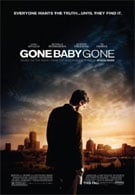Every parent’s nightmare is losing a child, and every detective’s nightmare is not being able to find one. But what happens when the parent is a deadbeat coke-head and the world-weary cops assigned to her case aren’t finding any leads? Based on a novel by Dennis Lehane (of Mystic River renown), Gone Baby Gone is a harrowing race against the clock through drug-deals, despair and corruption all for the sake of an innocent child. Like Mystic River before it, the film is set in Boston, demands intense performances from its actors, and happens to be horribly slow and depressing.
The film begins with a very realistic tour through the blue-collar neighborhood of Dorchester, where you might find some of the most colorful characters from Jerry Springer. The town has all rallied behind single mom Helene McCready (Amy Ryan) whose four-year-old daughter Amanda was taken from her home without a trace. After three days go by with no leads, Amanda’s desperate Aunt and Uncle hire baby-faced private investigator Patrick Kenzie (Casey Affleck) and his girlfriend Angie (Michelle Monaghan) to help probe “people in the neighborhood who don’t talk to the police.”
Patrick, who is conveniently buddy-buddy with just about every bartender, drug-dealer and degenerate in town, begins digging into Helene’s darker habits and quickly puts together a probable suspect list among her drug-addled cohorts. Teaming up with veteran detective Remy Bressant (Ed Harris) and Captain Jack Doyle (Morgan Freeman), Patrick dives deep into the underbelly of Dorchester’s crime ring in a last ditch effort to find Amanda before it’s too late. Only the closer that Patrick comes to solving the case, the more complicated it becomes until ultimately, he’s left in a place where the line between right and wrong become imperceptibly blurred.
For an actor who made his career out of overplayed leading man roles and larger than life off-screen romances, it’s surprising that Ben Affleck’s directorial debut is so gritty and realistic. Affleck gives his film an almost documentary-like feel, from the edgy camera work, to the heavily accented dialogue, to the actors themselves, who are not Hollywood glamorized but unattractive, swearing, sweat-suit wearing real life people. A far cry from similarly-themed blockbusters like Ransom, the film’s authentic vibe allows it to explore darker ideas like the age-old question “do two wrongs make a right,” without feeling preachy. Ultimately, Affleck leaves the moral judgments up to the audience, and Gone Baby Gone will certainly drum up some debates before it fades from viewers’ memories.
But while Ben Affleck certainly proves himself worthy of a spot behind the camera, he still could use a few more writing classes before I’ll believe he had anything to do with penning Good Will Hunting. The film moves at an achingly slow place, partially because the crime solvers rely on snitches and hearsay instead of actual clues to put together their case. Meanwhile, as Patrick falls deeper into a world of clouded morals and shady characters, the story depends too much on twists and turns as opposed to character development, forgoing the realism that made it so compelling in the first place. By the time the audience gets to the moral conundrum at the end, they’re likely to be too irritated by the manipulative story-telling to care.
Regardless of pacing issues, no one can question Ben Affleck’s casting decisions, even if they are an exercise in nepotism. Casey Affleck already has shown his acting chops in The Assassination of Jesse James, but his familiarity with the neighborhood and an innocent, youthful face makes him the perfect choice for Patrick Kenzie. Ben’s real casting gem however, was to bring in the husband and wife team of Ed Harris and Amy Madigan. Harris’ complex, jaded cop drives the film forward while Amy Madigan’s bit part as Amanda’s Aunt adds an emotional heart line to the story. The only disappointment is Michelle Monaghan, who just isn’t given enough room to shine in this gritty world.
Gone Baby Gone may out stay its welcome, but not before reasserting that there is room in our theater lineups for low-budget endeavors that concentrate more on performances than effects. It may not be a homerun for Affleck. but directors rarely knock it out of the park on their first attempt. If nothing else, lets hope the film is successful enough to drive Affleck back behind the camera, because it’s sure better than watching him in front of it.











